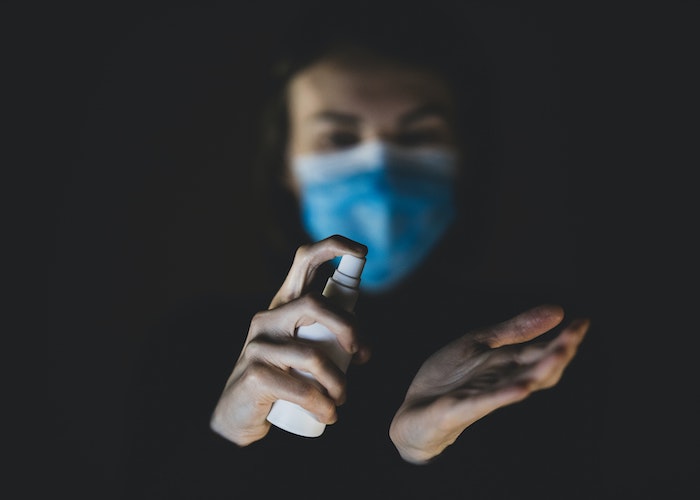How COVID Helped Me ‘Blend In Better’ As A Person With Severe OCD

[Possible trigger warnings: this post contains conversations on illness, compulsive thinking and behavior, phobias and other sensitive content.]
I don’t have COVID-19, but like anyone else, there’s always the fear that I’ll get it, or that I secretly already have it. It’s an understandable paranoia considering how contagious and deadly the virus is, but since I have Obsessive Compulsive Disorder that paranoia is tenfold.
Of course, germaphobia is a huge contributing factor to this issue, too. However, the biggest factor in this ongoing fear of contracting COVID is my intrusive thoughts. The mere thought that just because it can happen, leads me to believe it will happen. The fear that we, as a society, will never be entirely free of the virus, and that we’ll be in lockdown-limbo forever, is not easy to shake. This kind of magical thinking, and rumination on the worst-case scenario, often makes me forget about how hard I’m working to protect myself and others.
As of October of this year, there was a total of 40.8 million COVID cases worldwide and 1.13 million deaths. That’s enough to make almost anyone paranoid — and I’m not the only one. Neurotypical folks without OCD have also shown these fears with COVID too. These days, it’s hard to work out what is and isn’t an intrusive, impulsive, and obsessive thought, or compulsive behavior anymore.
The ‘new normal’ was always my regular normal
Before the virus broke out and reached pandemic-level, walking around with a face mask and reapplying hand sanitizer regularly, was perceived as being overly paranoid. Which is strange to me because, not only have countries like Japan been implementing such health-conscious habits for decades but, it’s not as though we were all entirely virus-free before COVID-19.
According to the CDC, between 2018-2019 there were around 35.5 million people who were sick with influenza, 16.5 million people going to their local doctor or clinic, 490,600 hospitalizations, and 34,200 deaths. So if more of us wore masks, got our flu shots, and washed our hands as regularly as we do now, perhaps those figures would be smaller.
Which leads me to ask:
Why was my pre-COVID behavior of wearing masks, carrying around hand sanitizer, and not wishing to touch random strangers, seen as mentally ill during 2018, but not now?
Simple: Because I’m not in the minority anymore.
My “normal,” your friend-who-has-anxiety’s “normal,” and a huge population of Japanese peeps’ normal — is now everyone’s new normal.
Personally, I resent the fact that the world went from mocking people like me, to agreeing with us only when things got really bad. But it’s still a good direction for society to go in regardless. Recently I spoke with Madeline Dyer, a young adult novelist with OCD, about how she feels on the issue:
“I’ve got OCD due to encephalitis.” Dyer began. “Which also makes me high risk for Covid (though I haven’t had it but keep thinking I might). It’s such a relief that I can now use hand sanitizer all the time and avoid hugging friends with no one questioning me.”
It makes total sense that we (of the OCD community) now feel validated in our previous discomforts, and in a way it helps us blend into the crowd more when we want to be hidden. After all, no one wants to be stared at as they wipe down their entire shopping cart before use.
I’m glad that society is taking health more seriously — well, not everyone, unfortunately — but it’s that questioning behavior prior to the pandemic that troubles me. When we are finally rid of this virus, is society going to continue mocking those with OCD for their germaphobic “quirks”?
Distinguishing the difference between fear and common sense
The line between compulsive behavior and what society deems as common sense in a pandemic is hazy.
In a vacuum, our fears are justified, as COVID is deadly. But it all comes down to how much we repeat our habits of cleanliness, how much stress it puts us under compared to the average person, and how much we ruminate on them.
I also spoke to Amanda Sellers recently, a licensed clinical psychologist who specializes in the treatment of OCD and other anxiety disorders. “COVID-19 has changed how psychologists treat Contamination OCD. Typically,” Sellers told me. “Exposure and Response Prevention (ERP) directly exposes a person to their feared contamination obsession (e.g.touching something perceived as dirty) and then prevents compulsive, compensatory behaviors (e.g. excessive handwashing) with the goal of better tolerating anxiety-provoking situations. Currently, typical practices that would be therapeutically beneficial (such as ERP activities out in the community) are contraindicated by CDC guidelines for COVID-19.”
So not only do we have to deal with the pandemic, and the Murphy’s law of it all, but now treatment is more physically limited. That being said, we just have to re-define how we look at these treatments.
“Imaginal exposures can be helpful right now,” Sellers continued. “Given limitations to doing live, in-vivo ERP. Psychologists frequently use imaginal exposures when fears can’t be tested in real life. This includes writing a script related to one’s fears, and listening to it repeatedly in order to habituate to an anxiety state.”
Separating the real threat from our OCD is difficult, especially since what everyone is (rightfully) doing now is what OCD folks have been doing for years. But I’m hopeful that good treatment will make that blurred line a little sharper.
Treatment options are still here during lockdown
Despite the confusion and ableism that’s out there, the upside is that there are still ways to deal with how your OCD interacts with the pandemic. It’s now easier than ever to access online therapy and resources, thanks to lockdowns.
Since ERP isn’t fully recommended at the moment, other treatment options include selective serotonin reuptake inhibitors, and Cognitive Behavioral Therapy.
As Sellers stated, “Psychologists are working to help patients refrain from excessive compulsive cleaning behaviors, and helping them to follow CDC guidelines but no more.”
She continued, “Right now, a large part of the therapeutic work for OCD is helping patients differentiate unrealistic vs. realistic precautions. For example, disinfecting fruits and vegetables with soap is excessive, contraindicated, and hazardous to health. Complete and total isolation is also contraindicated, as it can be unhealthy from a mental health perspective. Instead, psychologists can coach patients to still live their lives while engaging in healthy, realistic behaviors. These might include washing hands once when returning home, and wearing a mask and physical distancing when out in the community. Psychologists are also revising their practices over time, as CDC guidelines for COVID-19 continue to evolve.”
Whether you go through healthcare channels or independent means, there are tons of resources out there. And thanks to technology such as Zoom, you don’t even need to leave your home. If finding a therapist isn’t for you right now, there’s also a ton of free resources out there that include reading materials, exercise worksheets and diaries, meditation, and other self-help tools.
Stephanie Watson is a freelance journalist and copywriter from the UK, who specializes in psychology, sociology, and the beauty industry. She’s a budding novelist on the side, and hopes to one day make it her full time career.
Image via Unsplash
Like this story? Follow The Financial Diet on Facebook, Instagram, and Twitter for daily tips and inspiration, and sign up for our email newsletter here.


